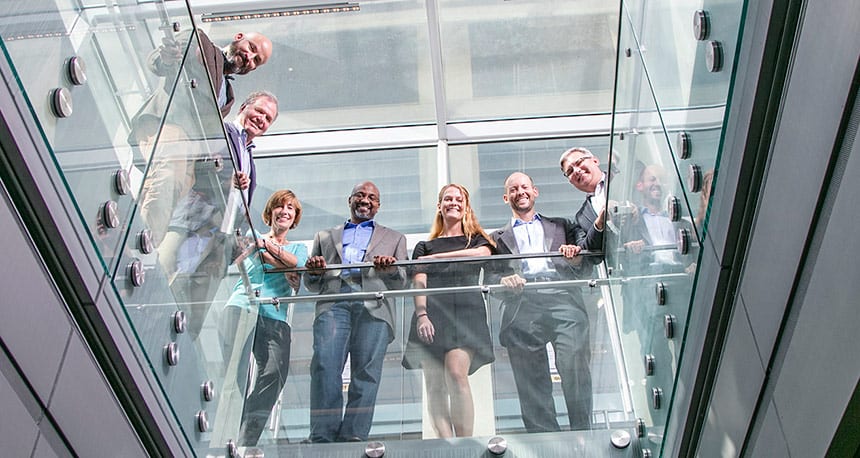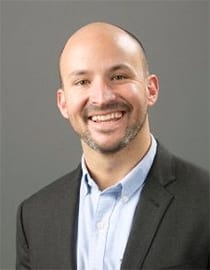
By Andrew Cohen
Students gain coveted hands-on training. Alumni forge networks in Silicon Valley. New ventures launch with free advice from startup lawyers.
The benefits go on and on for Startup@BerkeleyLaw, which has made quite a splash in its first year of existence. An umbrella for all business startup work across the school, the initiative trains Berkeley Law students to help entrepreneurs succeed, guides startups as they navigate tricky organizational issues and offers access to top experts, courses and workshops.
The program is a joint endeavor between the Berkeley Center for Law and Business (BCLB) and the Berkeley Center for Law & Technology. “Our work is driven by three main goals,” said Adam Sterling ’13, BCLB’s executive director. “Provide our students with exceptional training for startup work, deliver useful education and services to campus startups and connect the campus with Silicon Valley.”
Check, check and check.

“Startup@BerkeleyLaw has become a much-needed bridge between the law school and the entrepreneurs like myself at UC Berkeley,” said Naresh Sunkara, CEO of Nosocom Solutions. “The programs that are being organized and the startup resources that are being pulled together by Adam Sterling are outstanding.”
Sunkara’s company works to develop products that prevent and combat healthcare infections that patients contract while receiving treatment at healthcare facilities. He said about 1 in 25 people admitted to U.S. hospitals incur such infections, nearly 75,000 die each year as a result and the annual cost to the nation’s healthcare system is nearly $33 billion a year.
“Our startup has benefited tremendously by the participation of Berkeley Law students,” Sunkara said. “Since our core team was still too small, they filled a huge void by helping us with tasks such as performing additional market research, evaluating investment documents and contracts and looking into the history of litigations that the hospital industry goes through. Their thoroughness and attention to detail in gathering the necessary data has helped us answer several key questions.”
Creating a hub
At a recent “Lawyering for Innovation” panel during Alumni Reunion Weekend, tech industry leaders, faculty, alumni and students discussed Berkeley Law’s growing role in fueling entrepreneurship among startups. Startup@BerkeleyLaw further powers an intellectual property program ranked No. 1 among U.S. law schools in 17 of the past 19 years.

“It’s great to work where people are pushing the boundaries of what’s possible,” said former Apple general counsel Nancy Heinen ’82, now a strategy consultant and board advisor with the Silicon Valley Social Venture Fund. A longtime BCLB advisory board member, Heinen noted that “entrepreneurs do not accept the world as it is, nor should they. These people need guidance from great lawyers to help get their incredible ideas and innovations to the marketplace.”
Enter Startup@BerkeleyLaw. “We saw that the growing East Bay entrepreneur community was fragmented,” said Professor and BCLB Co-director Robert Bartlett. “We wanted to create a gravitational force to help capture the great innovation we’re seeing on and around campus.”
This school year, Berkeley Law students have access to more than 10 unique courses related to venture capital, intellectual property and entrepreneurship—taught by leading faculty and industry experts.
Startup@BerkeleyLaw also provides students with prime opportunities to work on key legal issues with startups through several hands-on programs. Two such initiatives, the New Business Practicum and the InSite Fellowship, team Berkeley Law and Haas Business School students to assist local startups with various thorny issues.

At the New Business Practicum, students address many legal challenges involved in launching a business—including managing risks and establishing key relationships with workers, investors and consumers. The InSite Fellowship, a prestigious national fellowship and mentoring program, enables graduate students seeking business experience to partner with early-stage companies in need of pro bono consulting.
Collaboration 101
One of Startup@BerkeleyLaw’s valuable partnerships is with SkyDeck, a leading campus incubator. Last year, the two groups teamed with the California Institute for Quantitative Biosciences to launch the school’s IP Practicum Seminar—which pairs Berkeley Law students with IP attorneys to provide critical services to local startups. Supported by classroom lectures, students spend 14 weeks completing freedom-to-operate surveys—which are essential for assuring biotech entrepreneurs that they have clear paths to pursue their projects.

“We hope to expand to other bite-size projects like that and take it to a sustainable transnational level,” said Professor Robert Merges, who oversees the course. “Much of the startup world’s center of gravity has shifted to the East Bay. It’s beating a path to our door, and we’re very happy about that.”
Startup@BerkeleyLaw also helped launch a new Student-Initiated Legal Services Project this fall: the Startup Law Initiative. Supervised by startup attorneys, students will help provide incorporation services for new ventures in the campus community.
“The law school is so well positioned to take advantage of this startup momentum going forward,” said Mitchell Zuklie ’96, the global chair and CEO of Orrick. “BCLB keeps taking on some of the most important, interdisciplinary issues out there to ensure that Berkeley’s future in this area will be stunning.”
Zuklie is among a growing number of Berkeley Law graduates helping students form pivotal networks with startup attorneys and emerging companies. Many of Silicon Valley’s top practitioners attended Berkeley Law, and Sterling—a former startup lawyer at Gunderson Dettmer—has enlisted numerous alumni and other experts to share their insights and expertise.
One example is the Venture Capital Speaker Series that brings major innovators, investors and other visionaries to campus. Leaders from 500 Startups, Andreessen Horowitz and Silicon Valley Bank have given presentations, and Uber general counsel Salle Yoo delivered a talk and answered questions on September 26.
“I’m not sure you can appreciate how much that means to us as students,” said Kelsea Carlson ’18, an InSite fellow who was a legal assistant at Google before law school. “That exposure and connection to Bay Area entrepreneurs and Silicon Valley is so valuable. As a corporate attorney, you’re trying to solve business problems. You better understand who your future clients will be.”
Startup takes off
That understanding is enhanced through Startup@BerkeleyLaw’s keynote initiative, the FORM+FUND Workshop Series. This certificate program, which tackles a different pervasive issue in the startup community each month, offers free office hours with leading attorneys and venture capital investors for entrepreneurs and students.
In addition, since last year Startup@BerkeleyLaw has developed and presented the legal curriculum at the Nasdaq Entrepreneurial Center in San Francisco, a nonprofit designed to educate, innovate and connect current and aspiring entrepreneurs.
Also coming soon: VC Unlocked—Deal Camp. This four-day program (October 18-21) will cover the fundamentals of venture capital deal making for investors and attorneys eager to improve their ability to define, negotiate and execute early-stage investments. Startup@BerkeleyLaw recently secured four major venture capital partners—500 Startups, AngelList, KPCB, and Y Combinator—with more on the way.
As if that’s not enough, on tap in January 2017 is the launch of Access to Entrepreneurship, which Sterling calls “a major initiative that will take the educational programs and legal services we’ve designed and make them available to entrepreneurs from underrepresented communities in the East Bay, Silicon Valley and Central Valley.”
Coming full circle

During the Alumni Weekend panel, Zuklie and classmate Duane Valz ’96 reminisced about taking the first course Merges taught at Berkeley Law. Both graduates marveled at how many tech-law opportunities the law school offers now compared to when they were students—and its ability to become a hub for the booming area startup scene.
The vice president and general counsel at Zymergen, Inc., Valz does see common threads linking today’s Berkeley Law students with his own experience two decades earlier. “Students come here looking to impact society in tangible ways,” he said. “They ask, ‘How can I help people accomplish their goals … and make a difference in people’s lives?’”
From Zuklie’s vantage point, his approach in leading a global law firm with 25 offices worldwide mirrors that of Startup@BerkeleyLaw.
“The key is helping people learn to practice in a collaborative, interdisciplinary way,” he said. “Right now, there are very few areas that don’t require a cross-disciplinary approach. Berkeley Law does a fabulous job of recognizing that … and I can tell you that in our hiring, grades and journal participation are less important than grit and an ability to collaborate effectively.”